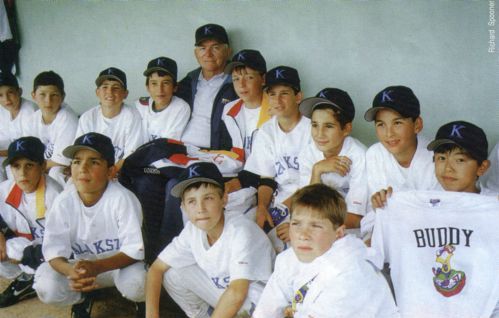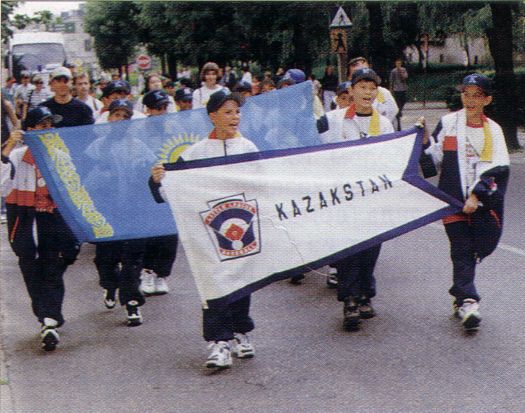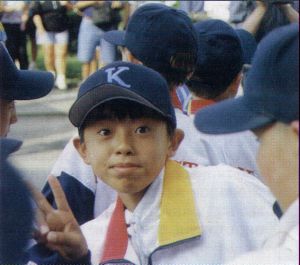


Baseball in Kazakhstan
 Returning from Kazakhstans first foray into the international baseball arena, the Almaty Little League All-Stars have a lot to be proud of, according to their coach and Almaty Little League Baseball President Richard Spooner. Fourteen boys from Kazakhstan aged 11-12 exceeded expectations and reached the semi-finals at the Little League European/Middle East/African championship held in Kutno, Poland from July 17-25. Perennial Little League champion Saudi Arabia was the only team in group 1 to defeat Kazakhstan. Meanwhile, the Almaty-based team won by impressive margins over England (6-2), Italy (10-0), the Netherlands (9-3) and Spain (6-0). A match between Kazakhstan and Germany, the undefeated winner of group 2, would decide who went to the finals to face the winner of the other semi-final between Saudi Arabia and Poland.
Returning from Kazakhstans first foray into the international baseball arena, the Almaty Little League All-Stars have a lot to be proud of, according to their coach and Almaty Little League Baseball President Richard Spooner. Fourteen boys from Kazakhstan aged 11-12 exceeded expectations and reached the semi-finals at the Little League European/Middle East/African championship held in Kutno, Poland from July 17-25. Perennial Little League champion Saudi Arabia was the only team in group 1 to defeat Kazakhstan. Meanwhile, the Almaty-based team won by impressive margins over England (6-2), Italy (10-0), the Netherlands (9-3) and Spain (6-0). A match between Kazakhstan and Germany, the undefeated winner of group 2, would decide who went to the finals to face the winner of the other semi-final between Saudi Arabia and Poland.
One interesting aspect of last weeks competition, Spooner noted, is that Kazakhstans performance was probably the strongest of any team made up primarily of local players. Saudi Arabia and Germany are the traditional champions of Little Leagues European tournaments and their teams are coached by Americans and made up exclusively of American players, the children of Americans working or serving in those countries, boys who were raised with baseball. The teams from Italy and Spain that Kazakhstan defeated were also 100% American and, like Germany, represented US military bases. The Saudi team is made up of sons of American oil company workers and their league has a budget that allows them to fly in coaches from the United States for special training. The Almaty team, 11 of whose 14 players are Kazakhstan citizens, is trained by a cadre of volunteer coaches both expat and local. Expatriate players are a tiny minority on the Leagues rosters.
Arriving at the tournament as an unknown, Kazakhstans strong defensive skills and team play earned the respect of the coaches, umpires and organizers in Kutno, including Robert Mann, Little Leagues European Regional Director, who was impressed with the team and expressed interest in visiting Almaty. Baseball requires a lot of preparation before you take the field. In the weeks before the Kutno Tournament, our players invested a lot of time in practicing, which the other teams recognized when we played against them, Spooner said.
League vice president Zhan Kanapianov, with help from former US Embassy official Chuck Bradley, recruited and trained the All-Star team from among those players aged 11 and 12 years old who most distinguished themselves last year and together possess the varied talents necessary to build a winning team. Zhans been instrumental in putting this team together as well as organizing the League over the past three seasons, Spooner said. Like Kananpianov, who accompanied the All-Star team to Kutno, more than a dozen of the Leagues coaches are Kazakhstan citizens, many of them players fathers, and that number is growing each year, When we started the League, it was our intent to have baseball take root in Kazakhstan and have the League nationalize itself, said Bruce Kososki, Almaty Little Leagues first president and founder. at our first game in 1995, the Prime Minister threw out the opening pitch (in America, it is traditional for the President of the United States to throw out the first ball each year at the opening of the professional league), Kososki recalled. At that time, Mr. Kazhegeldin said he looked forward to the day when young Kazakhstan players would compete internationally I think we can say that day has come.
 The Kutno tournament marks a first in Kazakhstans experience with a sport that has been several years in the making here. More than two years ago, Kososki, with support from Little League friends in San Ramon, California, and a handful of others in Almaty, formed the League according to the procedures and standards necessary for registering it with Little League headquarters in Williamsport, Pennsylvania (USA). Through Little League, baseball has spread internationally in the last twenty years and grown in dozens of countries as diverse as Zaire, Africa, where Kososki started a baseball program 5 years ago, to Moscow, where Spooner started a League in 1990. little League has also spread to many East Asian countries, like Taiwan, where the sport has become as popular, it has been argued, as it is in America.
The Kutno tournament marks a first in Kazakhstans experience with a sport that has been several years in the making here. More than two years ago, Kososki, with support from Little League friends in San Ramon, California, and a handful of others in Almaty, formed the League according to the procedures and standards necessary for registering it with Little League headquarters in Williamsport, Pennsylvania (USA). Through Little League, baseball has spread internationally in the last twenty years and grown in dozens of countries as diverse as Zaire, Africa, where Kososki started a baseball program 5 years ago, to Moscow, where Spooner started a League in 1990. little League has also spread to many East Asian countries, like Taiwan, where the sport has become as popular, it has been argued, as it is in America.
Corporate sponsorship provided the funds to cover the Almaty Little Leagues 1997 expenses, including a bulk purchase of equipment form the US for all three age groups, the trip to Kutno for the All-Stars form the 11-12 age group and maintenance at the Leagues three fields, among others. At Kososkis initiative, Chevron became the Leagues first major sponsor in 1995 and remains the Leagues main sponsor to this day. Other foreign companies who contributed to the Leagues budget this year are Amoco, Mobil Hurricane Hydrocarbons, Texaco and Citibank, Spooner, who shares Kososkis vision of the League becoming increasingly local in composition, looks forward to the day when local companies join these sponsors.
The semi-final game against Germany was very close throughout, Spooner described. The score was 0-0 until the bottom of the fifth inning, when Germanys pitcher tired a bit. Two walks and two doubles later Kazakhstan lead 2-0. Most of the crowd was rooting for underdog Kazakhstan and sensed a rematch with Saudi Arabia in the finals. I think the other teams in Kutno wanted us to win because we played with enthusiasm, we were new, Germany and Saudi had played numerous finals in recent years, Spooner said. But in the top of the sixth inning Germanys leadoff batter reached base after an error and the next batter tied the score with a 2-run homerun. Kazakhstan failed to score in the bottom of the sixth. In extra inning Kazakhstan twice had the winning run in scoring position, but couldnt get the game-winning hit needed. Germnay ultimately scored a run in the top of the ninth inning and triumphed 3-2. In the final the next day Saudi Arabia defeated Germany 7-3. The tournament did not include a game for third place.
 With 300 children and twenty teams currently competing in three age groups (9-10 year-olds, 11-12 year olds and 13-15 year olds), the Almaty Little League has expanded each year since 1995. one area where the League may get more active is in popularizing the game through the media. So, why play baseball? Baseball trains you to think as part of a team, to be organized, to keep a number of possible outcomes in min its a game about understanding probability, Spooner reflected.
With 300 children and twenty teams currently competing in three age groups (9-10 year-olds, 11-12 year olds and 13-15 year olds), the Almaty Little League has expanded each year since 1995. one area where the League may get more active is in popularizing the game through the media. So, why play baseball? Baseball trains you to think as part of a team, to be organized, to keep a number of possible outcomes in min its a game about understanding probability, Spooner reflected.
In Kutno the level of umpiring and organization of the tournament in general made an impression on everyone. Organization is something the League hopes to improve on for further development in the coming years. Id like to invite a Moscow team to come and play in Almaty, Spooner offered as one idea to encourage regional competitions. Kososki, meanwhile, is hopeful that a Little League program could be started in Kzyl-Orda. Next years tournament for the 11-12 age group will again be held in Kutno. Tournaments are held elsewhere in Europe for other age groups, and it is up to the Almaty Leagues management to decide at which tournaments to compete, based on whatever budget can be solicited from the Leagues sponsors. If this years performance is any indication, though, when Kazakhstan competes again next year, it is clear that it will be a new force to be reckoned with. That fact alone gives the European teams food for thought.
 The history of baseball
The history of baseball